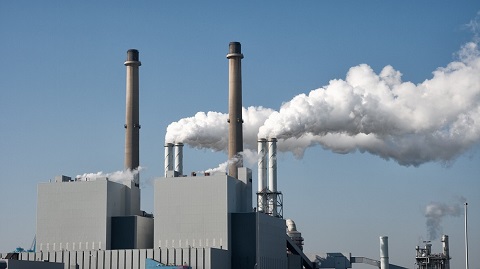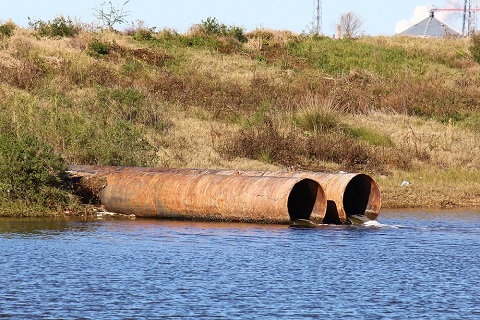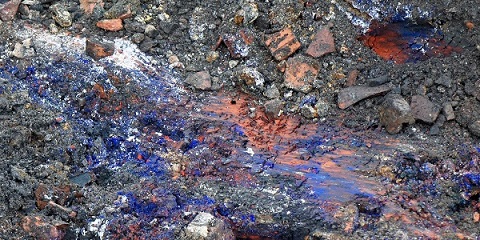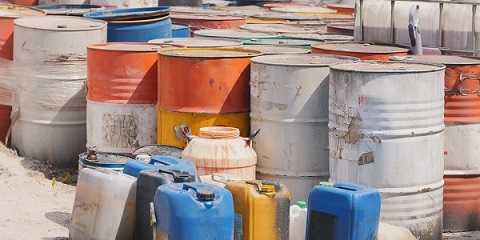About Pollution from Industries and Other Businesses
Factories, refineries, dry cleaners, and other businesses can pollute the air we breathe, water we depend on, and land around us. That pollution can have a big impact on the lives of people who live, work, play, and learn nearby. The impact can be anything from a mild headache to contaminated groundwater that may put us at risk during future droughts. There are laws to control how much businesses can pollute the area. Local, state, and federal agencies exist to help enforce laws that describe how much pollution is allowed. However, these agencies need your help to be their eyes and ears on the ground in your community.
Types of industrial pollution
Follow the links below to learn more about different types of industrial pollution and how to report problems in your community. If you need more information on how to report problems, please contact Public Health at (213) 738-3232
Air Pollution from Factories and Other Businesses

We all deserve to breathe clean, healthy air. Most air pollution in Los Angeles County comes from cars, trucks, and other vehicles but factories and other businesses also add to air pollution. When people live, work, play, and learn near polluting businesses it can create health problems including ear, nose, and throat irritation, headaches, asthma attacks, and an even greater risk of developing cancer.
The South Coast Air Quality Management District (SCAQMD) sets rules about how much and what kind of chemicals and other pollutants a business can put into the air. The SCAQMD permits and inspects businesses that contaminate the air to make sure that they are following the rules. Please visit their website for more information or to report a problem with outdoor air pollution at the SCAQMD website or call 1-800-CUT-SMOG.
Learn More about Air Pollution
Water Contamination

Everyone deserves clean, safe water and we must protect our water supply to make sure that our communities in Los Angeles County will have enough water for future generations. Water can become polluted in many ways. Sometimes businesses dump chemicals or hazardous waste on to the ground or in the sewer. Those chemicals can reach the groundwater and cause contamination of water that we might need in the future.
Follow the links below to learn more about clean water and how to report problems with your water.
- For Drinking Water please visit State Department of Public Health Drinking Water Program website or call (818)551-2004 for Los Angeles County area.
- For Ground Water please visit California Water Boards website or call (213)576-6600 for Los Angeles County area.
- To Report a Water Quality Problem, please visit California Water Boards Enforcement Program website or call (213)576-6600 for Los Angeles County area.
- For information on Storm Water, please visit California Water Boards Enforcement Program website
Soil Contamination

We all deserve to live in clean, healthy communities. Chemicals can travel in the air and end up in nearby soil or be dumped on to the ground directly. Chemicals that contaminate the soil around where we live, work, play, and learn can cause health problems, depending on the type of contamination. Different types of contamination can cause developmental disorders in children and greater chance of certain cancers.
Past soil contamination can also be a cause for what are called brownfields, which are abandoned and possibly contaminated properties. Brownfields can be unattractive areas in your community and prevent the redevelopment of a neighborhood. The California Department of Toxic Substances Control (DTSC) is responsible for overseeing cleanups at places with contaminated soils. For questions, call DTSC at 1-800-728-6942.
Follow the links below to learn more about soil contamination and health problems that can be related to contaminated soil.
- Brownfields (California Department of Toxic Substances Control)
- DTSC Contaminated Soil (California Department of Toxic Substances Control)
- Lead Poisoning Prevention (Los Angeles County Department of Public Health)
- Response to Exide (Los Angeles County Department of Public Health)
Toxic Chemicals and Hazardous Waste

We all deserve to live, work, play, and learn in a clean, healthy community. Factories and other businesses in our communities may use chemicals that can be toxic or be a health and safety threat if not properly used. There are rules about how much and what kinds of chemicals a business can use and how hazardous materials and hazardous waste must be used, stored, and disposed of. There are local, state, and federal agencies responsible for making sure that all businesses follow those rules.
Follow the links below to learn more about toxic chemicals, hazardous waste, and how to report problems in your community.
- For more information, please visit Los Angeles County Fire Health Hazardous Materials Division website
- How are businesses in your neighborhood doing? Find out at CAL EPA
- For more information, please visit the Agency for Toxic Substances and Disease Registry and Los Angeles County Environmental Health Toxicology and Environmental Assessment Program




